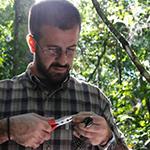Galimberti Andrea, PhD
Full Professor, Zoology

room 4009, building U4, tel. +39 02 6448 3412
lab 4012, building U4, tel. +39 02 6448 3415
see also: ResearchGate, Google Scholar, Scopus, ORCID
Keywords
Biodiversity, Biological interactions, DNA barcoding, DNA metabarcoding, Ecosystem services, Environmental DNA, Pollination, Species identification, Urban green systems, Zoology
Background
The interest in zoology and related disciplines (biodiversity, evolution, ecology of interactions) guided the training and the development of the research lines of Andrea Galimberti. His knowledge, acquired thanks to different research experiences, conducted both in Italy and in other EU and extra EU countries, make the figure of Andrea Galimberti in line with that of a modern biologist able to alternate field research, laboratory analytical activities, write project proposals and valorize his work by publishing scientific papers and attending to conferences. In 2007, Andrea Galimberti contributed to the foundation of the ZooPlantLab, a multidisciplinary research group where he developed his knowledge in zoology, and integrative biology, aiming at interpreting the different aspects of biodiversity. He studied different environmental typologies interested by conservation issues and inhabited by species at risk of extinction. He identified or collaborated to the description of new species (both invertebrates and vertebrates) and he also investigated emerging problems dealing with the loss of biodiversity and habitat fragmentation. Since the beginning of his research career, Andrea Galimberti collaborates with numerous protected areas and parks and combines his passion for field zoological activities (monitoring campaigns, bird banding, entomological surveys) with focused research aimed at biodiversity conservation. The most important point in his research activities is the topic of biological identification. He addresses this issue at different levels of complexity (species, populations, and communities) by using molecular techniques (e.g., DNA barcoding) and high throughput sequencing techniques (DNA metabarcoding) and combining these with morphological and ecological approaches. Currently, he is mainly involved in research projects aimed at the characterization of functional diversity and ecological interactions in natural parks, urban green areas, and agroecosystems. Since 2021 he is involved in the research team that coordinates the B-Green initiative, a project aimed at increasing the green areas of the Milano-Bicocca’s infrastructures.
Research interest
Integrative taxonomy, eDNA-based species detection, Ecosystem services, Plant-animal interactions, Urban biodiversity.
Research projects
-Ecosystem Services Tools
Anno: 2024
Enti finanziatori: MUSA - MULTILAYERED URBAN SUSTAINABILITY ACTION S.C.A R.L.
-Integrated actions to safeguard pollinators in urban and peri-urban areas (BUZZ-LIFE)
Anno: 2024
Bando: FAQC 2024 - prima finestra
Enti finanziatori: Università degli Studi di MILANO-BICOCCA
Selected publications
- Galimberti, A., Assandri, G., Maggioni, D., Ramazzotti, F., Baroni, D., Bazzi, G., ... & Casiraghi, M. (2021). Italian odonates in the Pandora's box: A comprehensive DNA barcoding inventory shows taxonomic warnings at the Holarctic scale. Molecular ecology resources, 21(1), 183-200. DOI: 10.1111/1755-0998.13235
- Galimberti, A., Cena, H., Campone, L., Ferri, E., Dell'Agli, M., Sangiovanni, E., ... & Labra, M. (2020). Rethinking urban and food policies to improve citizens safety after COVID-19 pandemic. Frontiers in Nutrition, 7, 181. DOI: 10.3389/fnut.2020.569542
- Biella, P., Tommasi, N., Akter, A., Guzzetti, L., Klecka, J., Sandionigi, A., ... & Galimberti, A. (2019). Foraging strategies are maintained despite workforce reduction: A multidisciplinary survey on the pollen collected by a social pollinator. PloS one, 14(11), e0224037. DOI: 10.1371/journal.pone.0224037
-Galimberti, A., De Mattia, F., Losa, A., Bruni, I., Federici, S., Casiraghi, M., ... & Labra, M. (2013). DNA barcoding as a new tool for food traceability. Food research international, 50(1), 55-63. https://doi.org/10.1016/j.foodres.2012.09.036
Galimberti’s Lab – #GalimbertiLab_BtBs
last update: May 2021